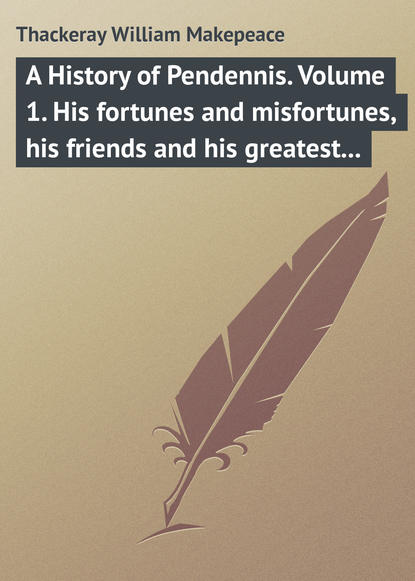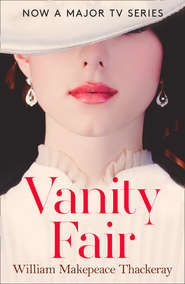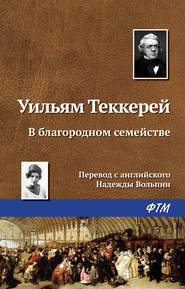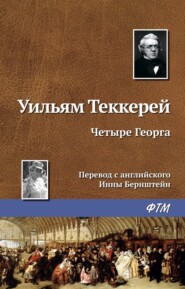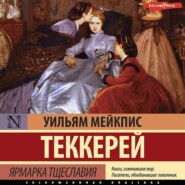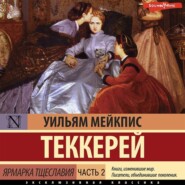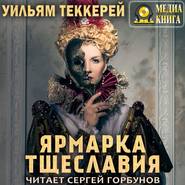По всем вопросам обращайтесь на: info@litportal.ru
(©) 2003-2024.
✖
A History of Pendennis. Volume 1. His fortunes and misfortunes, his friends and his greatest enemy
Настройки чтения
Размер шрифта
Высота строк
Поля
Pen, we say, who was a very excitable person, rolled out these verses in his rich, sweet voice, which trembled with emotion while our young poet spoke. He had a trick of blushing when in this excited state, and his large and honest gray eyes also exhibited proofs of a sensibility so genuine, hearty, and manly, that Miss Costigan, if she had a heart, must needs have softened toward him; and very likely she was, as he said, altogether unworthy of the affection which he lavished upon her.
The sentimental Smirke was caught by the emotion which agitated his young friend. He grasped Pen's hand over the dessert dishes and wine glasses. He said the verses were beautiful: that Pen was a poet, a great poet, and likely by heaven's permission to run a great career in the world. "Go on and prosper, dear Arthur," he cried; "the wounds under which at present you suffer are only temporary, and the very grief you endure will cleanse and strengthen your heart. I have always prophesied the greatest and brightest things of you, as soon as you have corrected some failings and weaknesses of character, which at present belong to you. But you will get over these, my boy; you will get over these; and when you are famous and celebrated, as I know you will be, will you remember your old tutor and the happy early days of your youth?"
Pen swore he would: with another shake of the hand across the glasses and apricots. "I shall never forget how kind you have been to me, Smirke," he said. "I don't know what I should have done without you. You are my best friend."
"Am I, really, Arthur?" said Smirke, looking through his spectacles; and his heart began to beat so that he thought Pen must almost hear it throbbing.
"My best friend, my friend forever," Pen said. "God bless you, old boy," and he drank up the last glass of the second bottle of the famous wine which his father had laid in, which his uncle had bought, which Lord Levant had imported, and which now, like a slave indifferent, was ministering pleasure to its present owner, and giving its young master delectation.
"We'll have another bottle, old boy," Pen said, "by Jove we will. Hurray! – claret goes for nothing. My uncle was telling me that he saw Sheridan drink five bottles at Brookes's, besides a bottle of Maraschino. This is some of the finest wine in England, he says. So it is, by Jove. There's nothing like it. Nunc vino pellite curas – cras ingens iterabimus æq– fill your glass, Old Smirke, a hogshead of it won't do you any harm." And Mr. Pen began to sing the drinking song out of Der Freischütz. The dining-room windows were open, and his mother was softly pacing on the lawn outside, while little Laura was looking at the sunset. The sweet fresh notes of the boy's voice came to the widow. It cheered her kind heart to hear him sing.
"You – you are taking too much wine, Arthur," Mr. Smirke said, softly – "you are exciting yourself."
"No," said Pen, "women give headaches, but this don't. Fill your glass, old fellow, and let's drink – I say, Smirke, my boy – let's drink to her —your her, I mean, not mine, for whom I swear I'll care no more – no, not a penny – no, not a fig – no, not a glass of wine. Tell us about the lady, Smirke; I've often seen you sighing about her."
"Oh!" said Smirke – and his beautiful cambric shirt front and glistening studs heaved with the emotion which agitated his gentle and suffering bosom.
"Oh – what a sigh!" Pen cried, growing very hilarious; "fill, my boy, and drink the toast, you can't refuse a toast, no gentleman refuses a toast. Here's her health, and good luck to you, and may she soon be Mrs. Smirke."
"Do you say so?" Smirke said, all of a tremble. "Do you really say so, Arthur?"
"Say so; of course, I say so. Down with it. Here's Mrs. Smirke's good health: hip, hip, hurray!"
Smirke convulsively gulped down his glass of wine, and Pen waved his over his head, cheering so as to make his mother and Laura wonder on the lawn, and his uncle, who was dozing over the paper in the drawing-room, start, and say to himself, "that boy's drinking too much."
Smirke put down the glass.
"I accept the omen," gasped out the blushing curate. "Oh, my dear Arthur, you – you know her – "
"What – Myra Portman? I wish you joy: she's got a dev'lish large waist; but I wish you joy, old fellow."
"Oh, Arthur!" groaned the curate again, and nodded his head, speechless.
"Beg your pardon – sorry I offended you – but she has got a large waist, you know – devilish large waist," Pen continued – the third bottle evidently beginning to act upon the young gentleman.
"It's not Miss Portman," the other said, in a voice of agony.
"Is it any body at Chatteries or at Clapham? Somebody here? No – it ain't old Pybus? it can't be Miss Rolt at the factory – she's only fourteen."
"It's somebody rather older than I am, Pen," the curate cried, looking up at his friend, and then guiltily casting his eyes down into his plate.
Pen burst out laughing. "It's Madame Fribsby, by Jove, it's Madame Fribsby. Madame Frib, by the immortal gods!"
The curate could contain no more. "O Pen," he cried, "how can you suppose that any of those – of those more than ordinary beings you have named, could have an influence upon this heart, when I have been daily in the habit of contemplating perfection! I may be insane, I may be madly ambitious, I may be presumptuous – but for two years my heart has been filled by one image, and has known no other idol. Haven't I loved you as a son, Arthur? – say, hasn't Charles Smirke loved you as a son?"
"Yes, old boy, you've been very good to me," Pen said, whose liking, however, for his tutor was not by any means of the filial kind.
"My means," rushed on Smirke, "are at present limited, I own, and my mother is not so liberal as might be desired; but what she has will be mine at her death. Were she to hear of my marrying a lady of rank and good fortune, my mother would be liberal, I am sure she would be liberal. Whatever I have or subsequently inherit – and it's five hundred a year at the very least – would be settled upon her and – and – and you at my death – that is – "
"What the deuce do you mean? – and what have I to do with your money?" cried out Pen, in a puzzle.
"Arthur, Arthur!" exclaimed the other wildly; "You say I am your dearest friend – let me be more. Oh, can't you see that the angelic being I love – the purest, the best of women – is no other than your dear, dear angel of a mother."
"My mother!" cried out Arthur, jumping up, and sober in a minute. "Pooh! damn it, Smirke, you must be mad – she's seven or eight years older than you are."
"Did you find that any objection," cried Smirke piteously, and alluding, of course, to the elderly subject of Pen's own passion.
The lad felt the hint, and blushed quite red. "The cases are not similar, Smirke," he said, "and the allusion might have been spared. A man may forget his own rank and elevate any woman to it; but allow me to say our positions are very different."
"How do you mean, dear Arthur?" the curate interposed sadly, cowering as he felt that his sentence was about to be read.
"Mean?" said Arthur. "I mean what I say. My tutor, I say, my tutor, has no right to ask a lady of my mother's rank of life to marry him. It's a breach of confidence. I say it's a liberty you take, Smirke – it's a liberty. Mean, indeed!"
"Oh Arthur!" the curate began to cry, with clasped hands, and a scared face, but Arthur gave another stamp with his foot, and began to pull at the bell. "Don't let's have any more of this. We'll have some coffee, if you please," he said, with a majestic air: and the old butler entering at the summons, Arthur bade him to serve that refreshment.
John said he had just carried coffee into the drawing-room, where his uncle was asking for Master Arthur, and the old man gave a glance of wonder at the three empty claret-bottles. Smirke said he thought he'd – he'd rather not go into the drawing-room, on which Arthur haughtily said, "As you please," and called for Mr. Smirke's horse to be brought round. The poor fellow said he knew the way to the stable and would get his pony himself, and he went into the hall and sadly put on his coat and hat.
Pen followed him out uncovered. Helen was still walking up and down the soft lawn as the sun was setting, and the curate took off his hat and bowed by way of farewell, and passed on to the door leading to the stable-court by which the pair disappeared. Smirke knew the way to the stables, as he said, well enough. He fumbled at the girths of the saddle which Pen fastened for him, and put on the bridle and led the pony into the yard. The boy was touched by the grief which appeared in the other's face as he mounted. Pen held out his hand, and Smirke wrung it silently.
"I say, Smirke," he said, in an agitated voice, "forgive me if I have said any thing harsh – for you have always been very, very kind to me. But it can't be, old fellow, it can't be. Be a man. God bless you."
Smirke nodded his head silently, and rode out of the lodge gate; and Pen looked after him for a couple of minutes, until he disappeared down the road, and the clatter of the pony's hoofs died away. Helen was still lingering in the lawn waiting until the boy came back – she put his hair off his forehead and kissed it fondly. She was afraid he had been drinking too much wine. Why had Mr. Smirke gone away without any tea?
He looked at her with a kind humor beaming in his eyes; "Smirke is unwell," he said, with a laugh. For a long while Helen had not seen the boy looking so cheerful. He put his arm round her waist, and walked her up and down the walk in front of the house. Laura began to drub on the drawing-room window and nod and laugh from it. "Come along you two people," cried out Major Pendennis, "your coffee is getting quite cold."
When Laura was gone to bed, Pen, who was big with his secret, burst out with it, and described the dismal but ludicrous scene which had occurred. Helen heard of it with many blushes, which became her pale face very well, and a perplexity which Arthur roguishly enjoyed.
"Confound the fellow's impudence," Major Pendennis said, as he took his candle, "where will the assurance of these people stop?" Pen and his mother had a long talk that night, full of love, confidence, and laughter, and the boy somehow slept more soundly and woke up more easily than he had done for many months before.
Before the great Mr. Dolphin quitted Chatteries, he not only made an advantageous engagement with Miss Fotheringay, but he liberally left with her a sum of money to pay off any debts which the little family might have contracted during their stay in the place, and which, mainly through the lady's own economy and management, were not considerable. The small account with the spirit merchant, which Major Pendennis had settled, was the chief of Captain Costigan's debts, and though the captain at one time talked about repaying every farthing of the money, it never appears that he executed his menace, nor did the laws of honor in the least call upon him to accomplish that threat.
When Miss Costigan had seen all the outstanding bills paid to the uttermost shilling, she handed over the balance to her father, who broke out into hospitalities to all his friends, gave the little Creeds more apples and gingerbread, than he had ever bestowed upon them, so that the widow Creed ever after held the memory of her lodger in veneration, and the young ones wept bitterly when he went away; and in a word, managed the money so cleverly that it was entirely expended before many days, and that he was compelled to draw upon Mr. Dolphin for a sum to pay for traveling expenses when the time of their departure arrived.
There was held at an inn in that county town a weekly meeting of a festive, almost a riotous character, of a society of gentlemen who called themselves the Buccaneers. Some of the choice spirits of Chatteries belonged to this cheerful club. Graves, the apothecary (than whom a better fellow never put a pipe in his mouth and smoked it), Smart, the talented and humorous portrait-painter of High-street, Croker, an excellent auctioneer, and the uncompromising Hicks, the able editor for twenty-three years of the County Chronicle and Chatteries Champion, were among the crew of the Buccaneers, whom also Bingley the manager liked to join of a Saturday evening, whenever he received permission from his lady.
Costigan had been also an occasional Buccaneer. But a want of punctuality of payments had of late somewhat excluded him from the society, where he was subject to disagreeable remarks from the landlord, who said that a Buccaneer who didn't pay his shot was utterly unworthy to be a Marine Bandit. But when it became known to the 'Ears, as the clubbists called themselves familiarly, that Miss Fotheringay had made a splendid engagement, a great revolution of feeling took place in the club regarding Captain Costigan. Solly, mine host of the Grapes, (and I need not say as worthy a fellow as ever stood behind a bar), told the gents in the Buccaneers' room one night how noble the captain had beayved: having been round and paid off all his ticks in Chatteries, including his score of three pound fourteen here, and pronounced that Cos was a good feller, a gentleman at bottom, and he, Solly, had always said so, and finally worked upon the feelings of the Buccaneers to give the captain a dinner.
The banquet took place on the last night of Costigan's stay in Chatteries, and was served in Solly's accustomed manner. As good a plain dinner of old English fare as ever smoked on a table was prepared by Mrs. Solly; and about eighteen gentlemen sate down to the festive board. Mr. Jubber (the eminent draper of High-street) was in the chair, having this distinguished guest of the club on his right. The able and consistent Hicks, officiated as croupier on the occasion; most of the gentlemen of the club were present, and H. Foker, Esq., and – Spavin, Esq., friends of Captain Costigan, were also participators in the entertainment. The cloth having been drawn, the chairman said, "Costigan, there is wine, if you like," but the captain preferring punch, that liquor was voted by acclamation: and "Non Nobis," having been sung in admirable style by Messrs. Bingley, Hicks, and Bullby (of the cathedral choir, than whom a more jovial spirit ne'er tossed off a bumper or emptied a bowl), the chairman gave the health of the "King!" which was drunk with the loyalty of Chatteries men, and then without further circumlocution proposed their friend "Captain Costigan."
After the enthusiastic cheering which rang through old Chatteries had subsided, Captain Costigan rose in reply, and made a speech of twenty minutes, in which he was repeatedly overcome by his emotions.
The gallant captain said he must be pardoned for incoherence, if his heart was too full to speak. He was quitting a city celebrated for its antiquitee, its hospitalitee, the beautee of its women, the manly fidelitee, generositee, and jovialitee of its men. (Cheers). He was going from that ancient and venerable city, of which while mimoree held her sayt, he should never think without the fondest emotion, to a methrawpolis where the talents of his daughther were about to have full play, and where he would watch over her like a guardian angel. He should never forget that it was at Chatteries she had acquired the skill which she was about to exercise in another sphere, and in her name and his own, Jack Costigan thanked and blessed them. The gallant officer's speech was received with tremendous cheers.
Mr. Hicks, Croupier, in a brilliant and energetic manner, proposed Miss Fotheringay's health.
Captain Costigan returned thanks in a speech full of feeling and eloquence.
Mr. Jubber proposed the Drama and the Chatteries Theater, and Mr. Bingley was about to rise, but was prevented by Captain Costigan, who, as long connected with the Chatteries Theater, and on behalf of his daughter, thanked the company. He informed them that he had been in garrison, at Gibraltar, and at Malta, and had been at the taking of Flushing. The Duke of York was a patron of the Drama; he had the honor of dining with His Royal Highness and the Duke of Kent many times; and the former had justly been named the friend of the soldier. (Cheers.)





